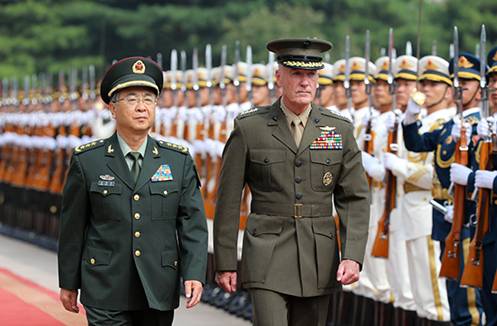China-US military cooperation necessary for world peace and global stability
- By Earl Bousquet
 0 Comment(s)
0 Comment(s) Print
Print E-mail China.org.cn, August 22, 2017
E-mail China.org.cn, August 22, 2017
 |
|
Joint communication and cooperation are important factors in current China-U.S. military ties, especially following recent meetings in China between General Fang Fenghui, chief of the People's Liberation Army's Joint Staff Department (left) and Marine Corps General Joseph Dunford, chairman of the U.S. Joint Chiefs of Staff. The two are seen here at a welcoming ceremony in Beijing on August 15 for the visiting U.S. official. [Photo/China Daily] |
However, these two powerful armed forces have actually been quietly talking and actively working together, at the highest levels, on issues of mutual and global importance, each side declaring mutual understanding of the significance of joint cooperation and confidence-building measures to not only regional stability, but also to world peace and security.
China's President Xi Jinping and U.S. President Donald Trump agree that deeper cooperation is essential; meanwhile, the respective heads of the Joint Chiefs of Staff have met, in China, to create new and activate existing mechanisms to promote and pursue the necessary levels of coordination for related cooperation.
General Fang Fenghui, chief of the China's People's Liberation Army (PLA) Joint Staff Department, on August 15 met his American counterpart, Marine Corps General Joseph Dunford, chairman of the U.S. Joint Chiefs of Staff.
Dunford later met with President Xi and they reiterated their shared commitment to work towards making military cooperation an important feature of improved overall bilateral ties and global affairs.
The Chinese president painted a clear vision of strengthening Sino-American military ties as a stabilizing factor in boosting mutual benefits for the world's two strongest economies and in contributing to global peace and stability.
He also noted that they shared joint responsibility to promote global development and prosperity.
Dunford assured his hosts that President Trump was just as committed as his Chinese counterpart to ensuring the continuance of the changed and changing levels of U.S.-China military cooperation.
Using very colorful adjectives, he noted that "under the strong leadership" of the two heads of state, bilateral military ties had made "positive progress," while the two armed forces "are in a mature relationship" and his side is committed to conducting a "sincere and professional dialogue" with China "in the military realm."
The brief meetings covered many subjects, but focused mainly on current areas of strategic engagement – especially strengthening the joint coordination mechanisms.
The military already have established dialogue mechanisms across many ranks and services, including the Defense Policy Coordination Talks between senior military officials, which also serves as a mechanism for dialogue and cooperation between the respective armies and navies.
Both sides had earlier agreed on the vital need for their joint staff departments – encompassing all military branches – to have more regular exchanges; during the most recent such exchanges, they signed a framework agreement to build a new shared communication mechanism of greater effectiveness that will reduce miscalculations and improve risk management, especially at a time of increasing concern about occasional tensions in regional and global affairs.
Exuding confidence, President Xi applauded the progress made, including enhanced dialogue at all levels, improved military confidence-building mechanisms and deepened cooperation.
He also welcomed the new cooperation agreement, pledging that Beijing remains prepared to make joint efforts with the U.S. to show mutual respect, focus on cooperation and accumulate more fruitful results.
The recent exchanges show both countries accept that the level and general direction of bilateral ties have wider implications for the overall international strategic situation and remain committed to joint military cooperation as a cornerstone in building strong bilateral ties.
Such peacetime cooperation is always useful, especially as modern weapons and other instruments of war have become so devastating.
The Chinese and American political, diplomatic and military directorates do exchange the usual expected barbs each time any of their ships or planes intersect in troubled waters or shared skies.
To date, only a war of words has been waged. However, just imagine the consequences, if cooperative mechanisms did not exist to avoid accidents, mistakes or miscalculations leading to conflict.
President Xi fully showed his optimism that Sino-American military ties today can be so improved to result in marked changes in the overall global peace and security climate.
Following his exchange with the top U.S. military official, he said that "despite some ups and downs" in the development of bilateral China-U.S. relations, "a rainbow comes after wind and rain."
Earl Bousquet is a contributor to china.org.cn, editor-at-large of The Diplomatic Courier and author of an online regional newspaper column entitled Chronicles of a Chronic Caribbean Chronicler.
Opinion articles reflect the views of their authors, not necessarily those of China.org.cn.






Go to Forum >>0 Comment(s)